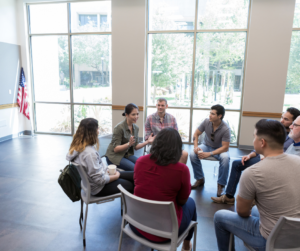For veterans of the military, adjusting to civilian life can be a major challenge. After spending months or even years in a tight-knit environment, it can be difficult to adjust to a world where you’re expected to go at it alone. Fortunately, there is help available. There are many communities dedicated to helping veterans transition back into civilian life.

Peer Support Groups
One way that veterans can find comfort and camaraderie after returning home is by joining peer support groups with other veterans who have gone through similar experiences. These groups provide an opportunity for members to talk about their feelings, share stories, and get advice from each other in an open and supportive environment. Attending peer support sessions can also help veterans develop coping skills for dealing with PTSD and other issues that arise as a result of their service.
Career Transition Assistance Programs
Another great resource for veterans is career transition assistance programs such as Troops To Tech Careers (TTTC). Through TTTC, veterans receive the knowledge and skills needed to build successful careers in the tech industry. Participants learn about coding languages such as HTML and CSS, how to manage databases and systems administration tasks, and how to create web applications from scratch—all in just 12 weeks! The program also provides mentorship opportunities so that participants can connect with more experienced professionals who can offer guidance on navigating workplace dynamics and job interviews.
Mentor Programs
The US Department of Veterans Affairs runs several mentor programs specifically designed to help veteran transition back into civilian life. These programs pair veterans with mentors who understand their unique needs and challenges due to their military experience. Mentors provide valuable advice on topics such as job search strategies, resume writing, networking tactics, financial planning tips, and educational opportunities. They also serve as emotional support systems during difficult times by listening without judgment and offering words of encouragement when needed most.
Veterans don’t have to go at it alone when transitioning back into civilian life after serving in the military; there are numerous communities dedicated to helping them make this adjustment easier. From peer support groups and career transition assistance programs to mentor programs through the Department of Veterans Affairs—there are plenty of resources available for those who need additional guidance during this time of change. Finding the right community will make all the difference!